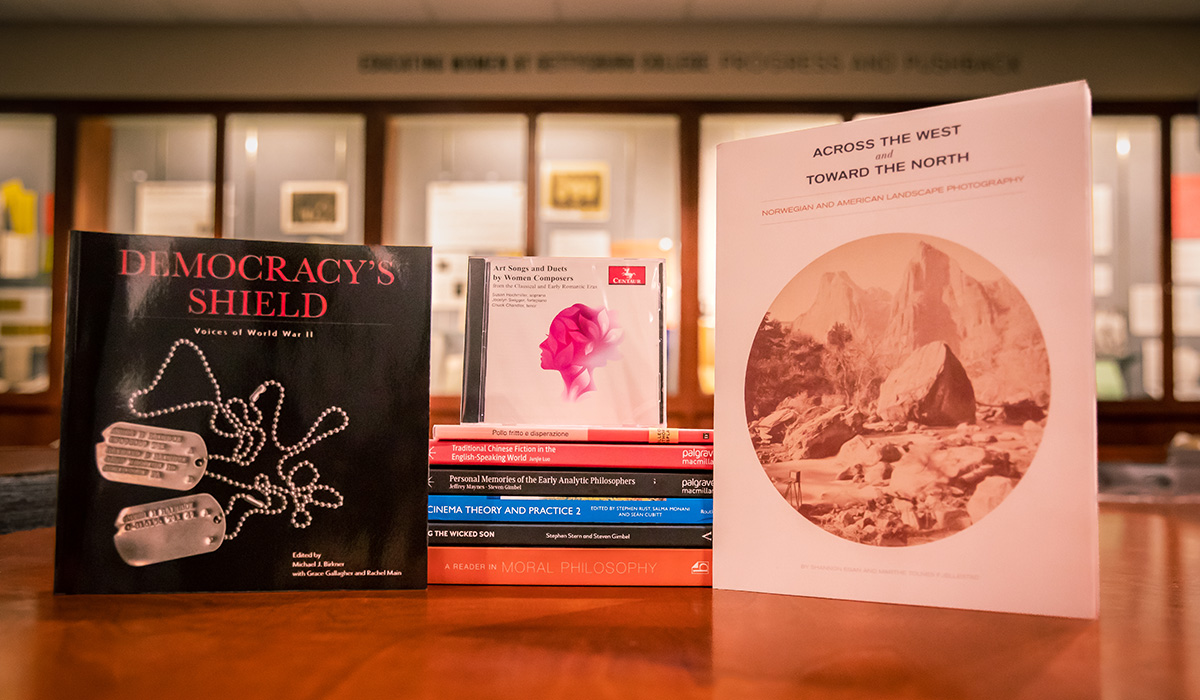
Inspired, passionate, engaged, and ever curious. These descriptors define Gettysburg College students, but they also capture the quest to create, discover, and explore—all attributes exemplified by Gettysburg’s faculty and staff. These talented professionals wholeheartedly delve into their research, embodying a contagious attitude and imparting upon students enduring skills for the lifelong pursuit of knowledge
Gettysburg’s faculty and staff members continually embrace and contribute innovation and research to the base of knowledge in their respective academic fields of study. In 2022, they released nine major works, eight books and one album, covering topics ranging from World War II history and moral philosophy to landscape photography and music by women composers.
Read more about the research and publications from Gettysburg faculty, staff, and emeriti members of the College community.
“Democracy’s Shield: Voices of WW II”
Co-edited by History Prof. Michael J. Birkner, Grace Gallagher ’23, and Rachel Main ’23
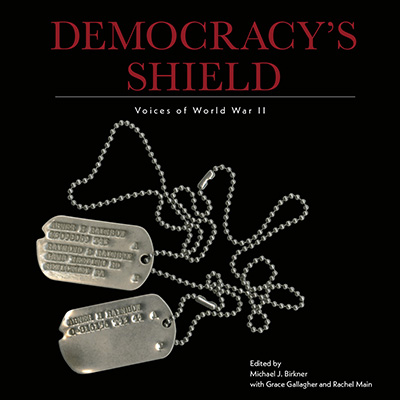
“Democracy’s Shield: Voices of WW II” represents the accounts from hundreds of oral histories conducted with World War II-era veterans between 1991 and 2015. Students in History Prof. Michael Birkner’s Historical Methods class conducted these interviews, which Birkner said document “in the words of those who served, the felt experience of World War II. It is by turns sober, funny, inspiring, and sad, reflecting what the men and women who went to war experienced.”
Grace Gallagher ’23 and Rachel Main ’23 assisted Birkner in selecting the most vivid, impactful quotes from the oral history collection to include in “Democracy’s Shield.” Throughout the work, readers will encounter images of artifacts from Special Collections at Musselman Library.
“You’ll read of occasions where wounded soldiers insisted on returning to the front, and others where wounds or injuries ended their war prematurely,” Birkner said. “You’ll get the perspective of the healers as well as the wounded. The editors hope that readers of ‘Democracy’s Shield’ will come away feeling closer to the war years as lived and remembered.”
“Democracy’s Shield: Voices of WWII” is available for purchase from Musselman Library. Proceeds benefit the G. Kenneth and Mary J. Newbould Fund for Oral History, which supports Gettysburg College and Musselman Library’s oral history program. This program began with Kenneth H. Newbould ’58, whose estate gift established the Newbould Fund for Oral History. Additional supporters have included Chris and Greg Dodds ’62 and members of the Eisenhower Society.
“A Reader in Moral Philosophy”
Edited by Prof. Emertius of Philosophy Dan DeNicola
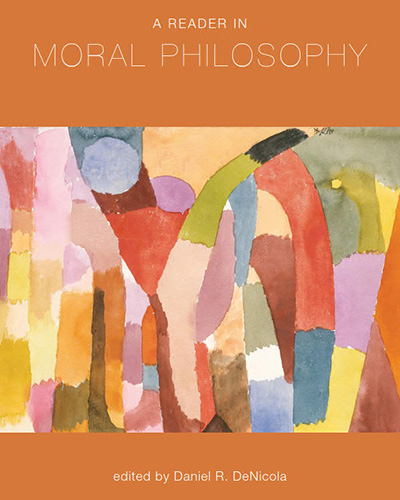
Designed as a companion reader to DeNicola’s 2018 work “Moral Philosophy: A Contemporary Introduction,” this anthology provides rich context for the critical examination of ethical theories and their application to such current issues as freedom of expression, immigration, abortion, and treatment of non-human animals.
This 640-page text includes 84 classic and contemporary readings organized according to the ultimate ground of moral values they engage, moving from “outer” sources of value—God, human nature, culture, reason, or contractual consent—to the “inner”—emotions, care, deep perception, or intuitions.
“Any reader would enter a provocative conservation among diverse thinkers on fundamental questions,” DeNicola said. “How is morality related to our humanity, what is its source, and how much of our lives should it claim? Can moral theory help us address difficult ethical issues?”
“Across the West and Toward the North: Norwegian and American Landscape Photography”
Co-edited by Director of Schmucker Art Gallery Shannon Egan and Marthe Tolnes Fjellestad
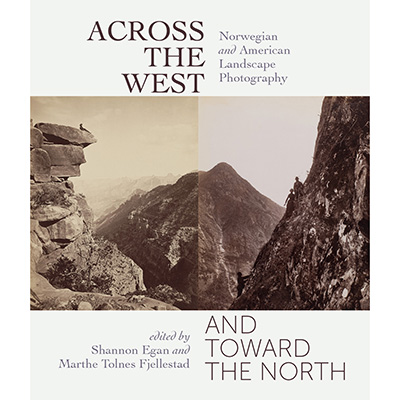
In this work, Director of Schmucker Art Gallery Shannon Egan describes the parallels in the distribution, production, and reception of landscape photography in Norway and the United States. Considering how these photographs are made meaningful to international audiences, Egan and co-editor Marthe Tolnes Fjellestad (curator at the Perspektivet Museum in Tromsø, Norway) provide a transnational study of how photography intersects with immigration, tourism, and its impact on Indigenous peoples.
“Making images while traversing almost inaccessible terrain—often on foot and for months at a time—photographers created a compelling visual language that came to symbolize each nation,” said Egan, who also teaches art history at the College. “In recognizing how landscape photographs were made meaningful to international audiences—such as tourists, visitors to world’s fairs, scientists, politicians and immigrants—we (the authors) challenge notions of American exceptionalism and singularly nationalistic histories.”
“Across the West and Toward the North” was produced in connection with a large-scale traveling exhibition, co-curated by Egan and Tolnes Fjellestad, that was installed in five museums and galleries in the United States and will open at the Bryggens Museum in Bergen, Norway, on May 19. The exhibition’s final venue will be the Norwegian Museum of Cultural History in Oslo, Norway, in summer 2024.
“Personal Memories of the Early Analytic Philosophers: Analytic Logic/Synthetic Lives”
Co-authored by Philosophy Prof. Steve Gimbel and Jeffrey Maynes ’05
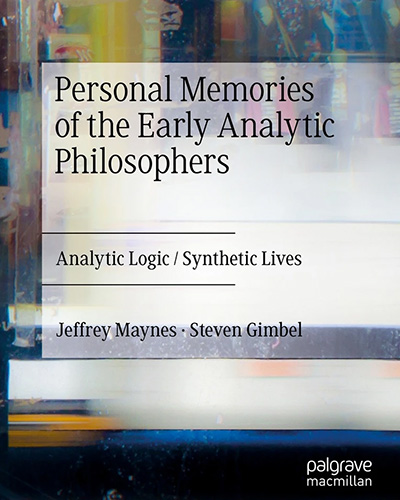
Analytic philosophy traces its roots to the first decades of the 20th century. Its founders include individuals such as Bertrand Russell, the Vienna Circle of Logical Positivists, and Hans Reichenbach’s Society for Empirical Philosophy. Moving beyond the story of the ideas that gave rise to analytic philosophy, Gimbel and Maynes bring to light the figures themselves, illuminating their lives and personalities by sharing memories of the people who knew them.
This collection of 11 edited transcripts of oral history interviews represents more than 20 years of research by Gimbel and Maynes into the personalities of these figures of analytic philosophy. The reflections from widows, spouses, classmates, and students who knew them best offer perspectives on these personalities of early analytic philosophical thought.
“The discussions touch on aspects of their philosophy but focus more on the stories of their lives, humanizing these champions of logical thought as they dealt with personal and political upheaval before, during, and after the horrors of World War II,” Gimbel said.
“Reclaiming the Wicked Son: Finding Judaism in Secular Jewish Philosophers”
Co-authored by Judaic Studies Chair and Religious Studies Prof. Stephen Stern and Philosophy Prof. Steve Gimbel
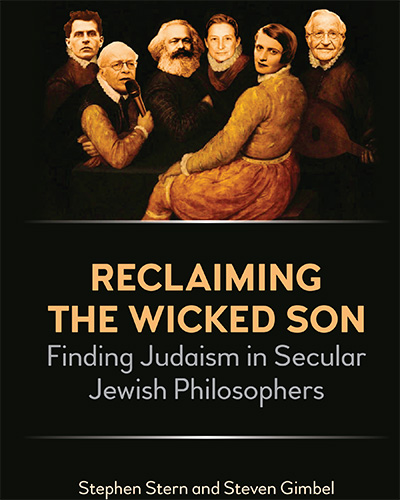
In this piece, Stern and Gimbel examine the works of six secular philosophers of Jewish heritage: Karl Marx, Ludwig Wittgenstein, Ayn Rand, Judith Butler, Peter Singer, and Noam Chomsky. Drawing upon different lenses from the history of Jewish ideas, the authors provide contemporary perspectives to the philosophers’ works.
“The ideas of Marx, Wittgenstein, Rand, Butler, Singer, and Chomsky are reinterpreted through Talmudic, prophetic, historical, and kabbalistic frameworks in playful and unexpected ways that allow these secular thinkers to be seen as part of the ongoing discourse of the Jewish tradition,” Gimbel said.
“From the minute we met, Steve and I have been arguing and discussing any issue nonstop. We come from different schools of philosophy and argument (in the philosophical sense) that refuse to acknowledge one another as philosophy. I come out of the European tradition, and Steve comes out of the Anglo-American tradition. I lean toward narrative explanations, and Steve leans toward a logical argument,” Stern said.
Through their academic arguments, Gimbel and Stern recognized an opportunity, one that would “blur the lines between Jewish philosophy and Jews who philosophize outside Jewish thought,” according to Stern. From there, the idea for “Reclaiming the Wicked Son” began.
“If Steve and I had not been arguing for two decades, there would be no book. Our book came out of the classes we teach at Gettysburg—it exemplifies teacher-scholarship. Steve and I are more than grateful and in debt to Gettysburg College for providing the environment in which we forged a fantastic intellectual and close friendship,” Stern added.
“Traditional Chinese Fiction in the English-Speaking World: Transcultural and Translingual Encounters”
By East Asian Studies Prof. Junjie Luo
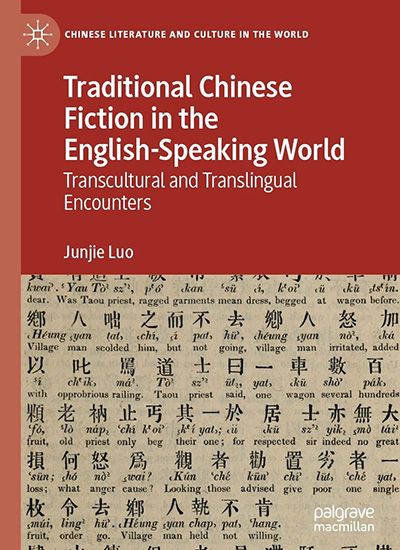
Traditional Chinese fiction reveals many memorable characters and scenes. There’s Monkey with its magic power in “Journey to the West” and the battle of Red Cliffs in “Romance of the Three Kingdoms, but analysis of characters and scenes is not the focus of Luo’s book. He instead examines the transcultural significance of these Chinese texts. Luo’s work is part of the “Chinese Literature and Culture in the World” series.
“Traditional Chinese fiction, a highly influential genre of Chinese literature, is read in many cultures,” Luo said. “This book examines the translation and consumption of these novels and stories in the English-speaking world from transnational perspectives and argues that cultural and literary trends, such as Modernism and the rise of historical novels, shape the reception of these fictional narratives.”
“Ecocinema Theory and Practice 2”
Co-edited by Environmental Studies Prof. Salma Monani
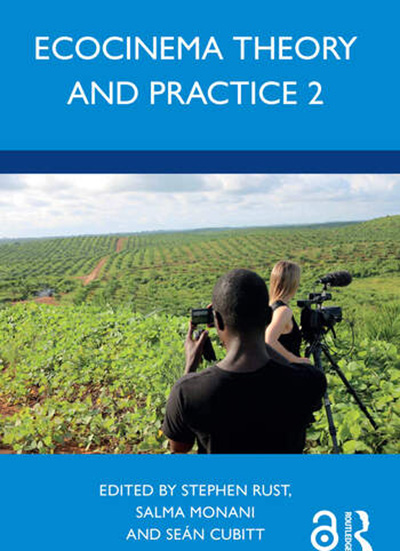
This edited collection expands upon “Ecocinema Theory and Practice 1,” which explores the ways in which ecocritical cinema studies research has developed over the past decade and helped establish the field of ecocinema studies in 2012. In this second volume, 14 essays organized in three subsections present dynamic topics within the field of ecocinema research.
“Reaching beyond the first volume’s attention to Hollywood and the Western gaze of wildlife documentaries to films and film industries across the globe, the second volume showcases the environmental promises and planetary perils of such media in an era of visual information communication technologies,” Monani said.
Throughout the work, readers encounter perspectives from ecocinema scholars championing new decolonial, ecocritical, feminist, Indigenous, and other emergent theories to study environmental injustices and the climate crisis. The essays cover themes including ecojustice, political ecology, and environmental production studies.
“Pollo Fritto e Disperazione: Un’antologia americana” (Translated: Fried Chicken and Desperation: An American Anthology”)
Edited by English Prof. Rachele Salvini
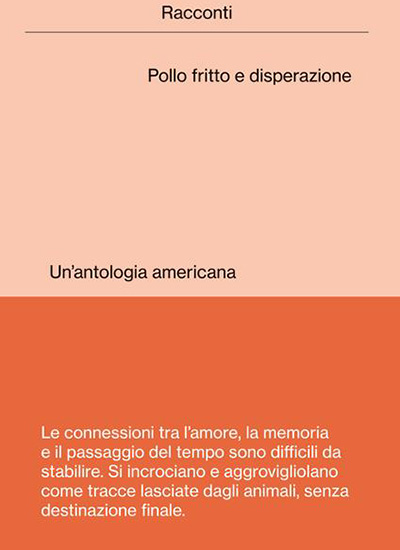
This collection of short prose features works of American writers studying, teaching, and promoting academic programs of creative writing. Salvini researched the pieces, translated them into Italian, and curated them for inclusion in this anthology.
The works contained in this anthology reflect themes covering cultural and gender identity to neuroses from loss that comes with the passing of time. Authors featured in the anthology include Lance Olsen, Brandon Hobson, Tyler Mills, Christopher Linforth, Constance Squires, and Aimee Parkison.
“In ‘Pollo Fritto e Disperazione,’ I collected prose by established or emerging writers gravitating around Oklahoma State University, where I completed my Ph.D. in creative writing. I translated these works into Italian, hoping to shed some light on the work that is getting workshopped and published by students and teachers from a big creative writing program,” Salvini said. “By collecting, translating, and reflecting on these works, I inquire on the limits and possibilities of similar courses in the context of Italian academia.”
“Art Songs and Duets by Women Composers From the Classical and Early Romantic Eras”
Co-produced by Sunderman Conservatory of Music Profs. Jocelyn Swigger and Susan Hochmiller
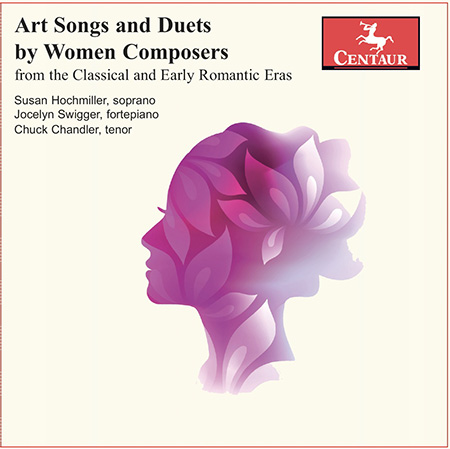
This creative collaboration by two Sunderman Conservatory of Music faculty members highlights previously unrecorded pieces of music from a canon of women composers representing the Classical and Early Romantic eras. Featured composers include Corona Schröter (1751-1802), Sophia Maria Westenholz (1759-1838), Maria Adelheid Eichner (1762-1787), and Mary Ann Pownall (1751-1796).
The recordings feature Hochmiller on voice and Swigger providing accompaniment on Gettysburg College’s fortepiano, a copy of a 1790 Viennese fortepiano gifted to the College by Bert and Joyce Elsner ’58. All music for the album was recorded in the rehearsal hall at Gettysburg College’s Majestic Theater.
Swigger said the inspiration for the work originated from studying a multi-volume anthology of art songs by women composers. Both she and Hochmiller thought it would be interesting to examine some of these pieces with the idea of helping young singers expand their repertoire options from the Classical era.
“A few years ago, one of my students was programming a recital by women composers, and she had a difficult time finding a woman composer from the Classical era,” Hochmiller said. “Her research introduced me to this anthology and motivated our recording project.”
“We sang through lots and lots of songs in this anthology collection with a color-coded Post-It system,” Swigger said, “with red for the songs we loved and pink for the ones we liked. It turned out that we had an album worth of songs by women composers.”
Through her work with Hochmiller on this album, Swigger said she was inspired to delve more into the work of women composers and ultimately discovered Agnes Tyrrell (1846-1863). Swigger played a premiere of Tyrrell’s sonata in February 2023 in Gettysburg (an album and presentation on Tyrrell’s work is forthcoming).
Hochmiller and Swigger presented a lecture recital on this repertoire at the 2020 Music by Women Festival in Mississippi and virtually at the 2020 College Music Society National Conference. Hochmiller, author of “So You Want to Sing Chamber Music: A Guide for Performers,” has programmed some of this repertoire in Orvieto, Italy, where she serves as the director of Orvieto Musica’s Art of Song vocal chamber music festival.
“Art Songs and Duets by Women Composers From the Classical and Early Romantic Eras” is available on digital music sources such as Spotify and Apple Music.
Special thanks to Musselman Library’s Devin McKinney, archives assistant; Kerri Odess-Harnish, director of user services; Carolyn Sautter, director of Special Collections and College Archives; Amy Lucadamo, College archivist; Mary Wootton, conservator; and Ron Couchman, special collections assistant, for providing photography coordination and support for this feature.
By Michael Vyskocil
Book photo collection by Abbey Frisco
Posted: 05/03/23